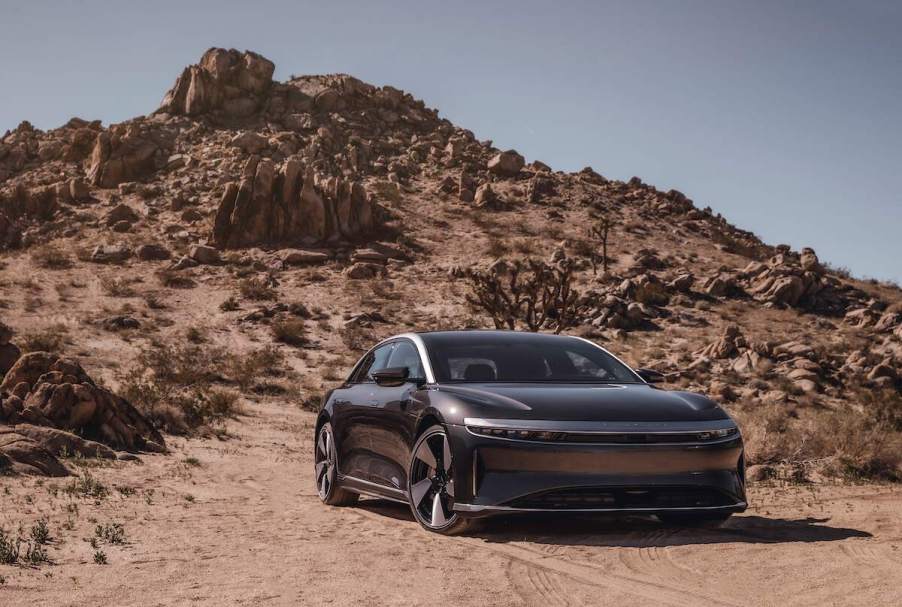
2 EV Brands Face Troubled Waters Amid Poor Demand
As the EV boom continues, it’s make-or-break time for a handful of upstart electric car brands. Both Lucid and Fisker face tough times, as early 2023 returns show weakening results. As shares of Lucid and Fisker lose value, can these two brands survive long enough to become profitable?

Tumbling EV prices reduce demand for Lucid products
From its inception, Lucid touted an ultra-luxurious aesthetic. With six-figure price tags and four-figure power numbers, the Lucid Air was designed to make a splash. Unfortunately for the new EV brand, troubling economic waters changed the way buyers look at new cars. This is especially true for EVs, where a narrower experience gap makes it harder to justify high price tags.
As such, Lucid sales slumped early in 2023, selling just 2,300 vehicles and tallying $835.7 million in losses, according to Yahoo Finance. In turn, the luxury EV brand cut production targets from a maximum of 14,000 units to just 10,000 cars total for 2023.
Fisker finds itself in the same predicament. Though a higher-volume brand, it too has cut production targets from 42,400 to, at most, 36,000 vehicles.
Why are luxury EV brands struggling?

Answering the question of why luxury EV brands are struggling is simple: price. As Ford and Tesla engage in a price war, ever-lowering electric vehicle prices improve adoption. They also gain mainstream attention, while upmarket brands like Lucid have little opportunity to gain market share.
When you’re burning through nearly $1 Billion a quarter, it’s hard to justify lowering prices. And if your brand is built on a luxury image, it’s doubly difficult to get away with.
Adding to the misery, the Hyundai Ioniq 5 and Ioniq 6, along with the KIA EV6, provide buyers with electric vehicles that feel upscale without the big price tag.
Also playing in the high-dollar EV arena are established luxury brands like Mercedes-Benz, Audi, and BMW. The latter of which just saw a 92% increase in sales for its flagship 7 Series executive sedan.
For Lucid, this conflagration is hard to ignore and difficult to overcome. With just $900 million in cash and assets, the upstart electric automaker isn’t in a position to accrue billion-dollar losses for much longer.
Can Lucid and Fisker survive?
While each company’s position is shaky at the moment, there is cause for positivity for both Lucid and Fisker. For one, Fisker began delivery of its Ocean SUV this week, though Bloomberg believes there may be some software issues that need to be addressed. That said, getting cars into the hands of buyers is an important step. If those buyers are impressed, Fisker may well see a path forward.
For Lucid, things are a bit trickier. Earlier this week, we reported on the demand deficit that has Lucid cutting production. With such a high-dollar product, demand is everything, and there is little the brand can do to make waves. As it pushes ahead with plans for its Gravity SUV next year, the cash will have to start flowing soon, or the company may be in trouble.
A hot start cools rapidly
Back in 2021, Lucid was a brand on fire. Beating out Porsche, Tesla, and Audi at the top of the luxury EV food chain, the Air was a revelation. Since then, though, the competition began catching up and Lucid fell behind. At this point, it’s critical to right the ship. Only time will tell if it can keep things afloat.




